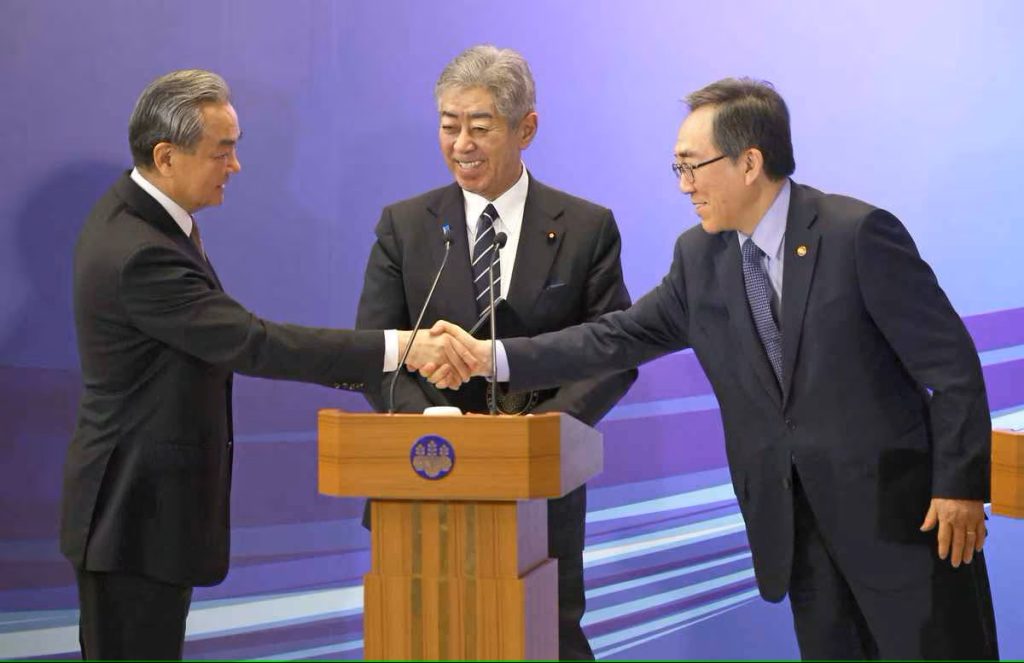
Foreign Minister Takeshi Iwaya (front right) and Chinese Foreign Minister Wang Yi (front left) met in Tokyo on the afternoon of March 22. (©Sankei by Takumi Kamoshida)
このページを 日本語 で読む
Foreign Minister Takeshi Iwaya hosted a meeting with Chinese Foreign Minister Wang Yi in Tokyo on March 22. Iwaya emphasized that China and Japan seek to comprehensively promote a "Mutually Beneficial Relationship Based on Common Strategic Interests." The two top diplomats agreed to work to reduce issues and concerns and increase cooperation between China and Japan.

Following the meeting, a ministerial-level Japan-China high-level economic dialogue was held for the first time in six years. A trilateral foreign ministers' meeting of Japan, China, and South Korea was also held. It is intended to accelerate preparations for a trilateral summit meeting within the year.
Wang Yi's Anti-US Maneuvering
During his meeting with Iwaya, Wang said it was important to actively promote steady and long-term bilateral relations between Japan and China. In their economic dialogue, Wang declared that "unilateralism and protectionism are rampant" and stressed the importance of Japan-China cooperation. Obviously, he had the Trump administration in mind.
As China comes under increasing pressure from the Trump administration, it is no doubt eager to improve relations with Japan. It is also hoping to increase Japanese investment in China, which has been declining in recent years. In addition, it would also seem that Beijing is intent on fracturing the Japan-US alliance.
However, strengthening ties with China is unlikely until there are significant improvements in China's actual behavior.
During their meeting, the two foreign ministers confirmed that bilateral discussions would proceed about resuming imports after China's Japanese seafood ban. China banned all such imports following the release of ALPs treated water from the Tokyo Electric Power Company's Fukushima Daiichi Nuclear Power Station. That announcement amounted to nothing but hoopla since no time frame was given for the resumption of those imports.
Nor was there any progress regarding the release of several detained Japanese nationals who remain in custody in China. China has held them on various, often unspecified, charges. Unless this serious human rights issue is resolved, Japanese companies cannot do business in that country with peace of mind.

China's Increasing Intimidation Tactics
In the 24 hours leading up to the morning of the foreign ministers' meeting, the Chinese military deployed a total of 47 military aircraft and seven warships around Taiwan. The location was immediately adjacent to the southernmost part of Okinawa Prefecture.
Such strong-armed attempts at intimidating Taiwan are totally unacceptable. What is more, the problem of China Coast Guard vessels intruding into Japanese territorial waters remains unresolved. They intrude regularly around the Senkaku Islands, and Beijing has situated Chinese buoys in Japan's exclusive economic zone off the coast of Yonaguni Island. These activities must stop if there is to be progress in the bilateral relationship.
Clearly, the conditions required for improving Japan-China relations and expanding cooperation are not yet in place. Prime Minister Shigeru Ishiba and Foreign Minister Iwaya should stop clinging to the concept of a "strategic mutually beneficial relationship" with China. This concept itself is no longer in keeping with the times or Japan's national interest.
Perhaps there will be high-level economic dialogue, or the business community may send delegations to China. However, if the safety of Japanese nationals cannot be guaranteed, it will be dangerous to advance cooperation and collaboration.
We also have to be concerned about a possible Taiwan crisis.
The Prime Minister and Iwaya must prioritize getting China to significantly improve its behavior.
RELATED:
- Ishiba Administration is Falling Into China's Seduction Trap
- Secretary of Defense Pete Hegseth Needs a To-Do List For Japan
- Japan Should Just Remove Chinese Buoy Near Yonaguni Island
Author: Editorial Board, The Sankei Shimbun
このページを 日本語 で読む







